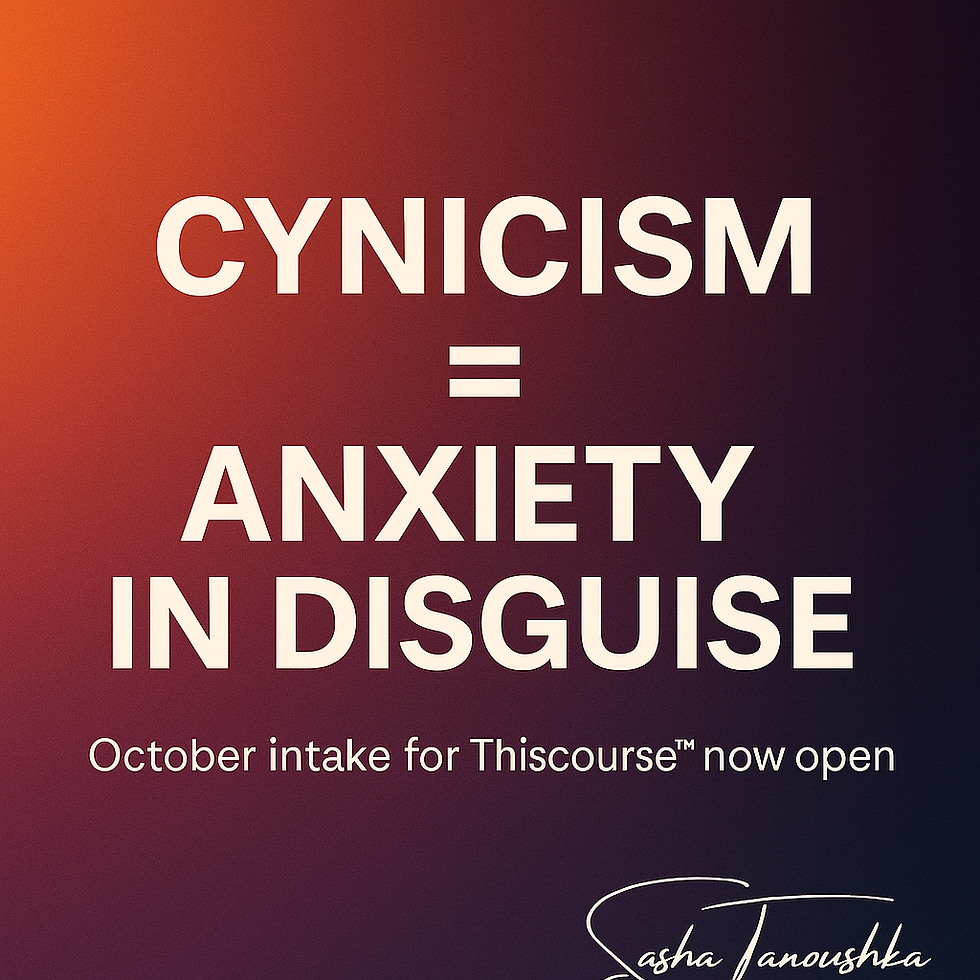
Cynicism = Anxiety
- Sasha Tanoushka BCH IACT

- Aug 28, 2025
- 3 min read
Cynicism: Anxiety in Disguise (and Why Positivity Feels Hard)

Cynicism is everywhere these days. From news headlines to workplace conversations to the quiet mutterings in our own minds—it’s easy to slip into expecting the worst. But beneath the sharp edges of cynicism lies something softer and more vulnerable: anxiety.
In this blog, we’ll unpack why people lean into cynicism, how it’s connected to anxiety and fatigue, and why positivity can feel so elusive—backed by peer-reviewed insights.
Cynicism as a Shield
Cynicism often presents as “realism.” It feels safer to assume the worst than to risk disappointment. For some, it’s a protective mechanism—a way to avoid the sting of failed expectations.
But research shows cynicism doesn’t just shield us; it also isolates us. High levels of cynicism are linked to depression, poorer health, reduced earnings, and even shorter life spans. What starts as self-protection becomes self-sabotage.
Anxiety and Emotional Exhaustion
One of the strongest drivers of cynicism is anxiety.
A study of first responders in South Africa found that high cynicism scores were significantly correlated with anxiety, depression, and fatigue—creating a feedback loop where exhaustion fuels negativity, which then deepens mental distress. In fact, fatigue was identified as the “bridge symptom” between anxiety and cynicism (Bezuidenhout et al., 2024).
Similarly, research into burnout shows that emotional exhaustion strongly predicts cynicism. When people are depleted, the mind defaults to negativity as a way of bracing for further stress.
The Brain’s Negativity Bias
Cynicism also has roots in basic brain wiring. Psychologists call it the negativity bias: the tendency for our minds to give more weight to negative experiences and information than positive ones.
From an evolutionary perspective, this made sense—ancient humans who noticed threats were more likely to survive. But today, this bias means we often overemphasize the negative and undervalue the positive, leaving positivity feeling harder to grasp, even when life is objectively good.
Defensive Pessimism vs. Cynicism
Not all negative outlooks are destructive. Defensive pessimism is a coping strategy where anxious individuals imagine worst-case scenarios, not to wallow in them, but to prepare better. Studies show that defensive pessimism can actually improve performance and reduce anxiety because it channels worry into planning.
Cynicism, by contrast, offers no preparation. Instead, it locks us in a worldview where people can’t be trusted and good outcomes are unlikely—eroding motivation and connection.
Breaking the Loop
If cynicism is fueled by anxiety and exhaustion, then breaking the loop means:
Restoring energy (addressing fatigue and stress)
Rewiring patterns (challenging the negativity bias through practices like gratitude, mindfulness, or subconscious work)
Rebuilding hope (choosing balanced optimism rather than blind positivity)
Hope, meaning, and resilience aren’t luxuries—they are lifelines. When we cultivate them, we not only reduce cynicism but also improve health, relationships, and creative flow.
Moving Forward with Thiscourse™
That’s why I created Thiscourse™—a guided reset for the mind and body.
Unlike traditional talk therapy that can take months or years, Thiscourse™ integrates:
Hypnotherapy and subconscious rewiring (to shift deep patterns of negativity)
Neuroscience-based disentrainment (to calm overactive brain rhythms and reduce anxiety loops)
Practical tools for resilience and presence
In just 10 days, clients often notice changes: less rumination, less anxiety, less reliance on pharmaceuticals, and more capacity for love, creativity, and joy.
✨ Less time stuck in cynicism.
✨ More energy to build your new reality.
✨ More freedom to love life and those around you.
References
Bezuidenhout, A. et al. (2024). Being cynical is bad for your wellbeing: A structural equation model of the relationship between cynicism and mental health in first responders in South Africa. ResearchGate.
Schaufeli, W. B. & Taris, T. W. (2014). A meta-analysis of burnout studies: Emotional exhaustion, cynicism, and reduced efficacy. Springer.
Rozin, P. & Royzman, E. (2001). Negativity bias, negativity dominance, and contagion. Personality and Social Psychology Review, 5(4), 296–320.
Norem, J. K. (2001). The Positive Power of Negative Thinking: Using Defensive Pessimism to Harness Anxiety and Perform at Your Peak. Basic Books.
Greater Good Science Center (2023). How to find hope when you’re feeling cynical. University of California, Berkeley.
Time for Action
🌟 Enrollment is now open for the October intake of Thiscourse™.
If you’re ready to step out of cynicism and anxiety—and step into clarity, energy, and positivity—this is your moment.
👉 Learn more and book your free discovery email:
📩 Or DM me directly to reserve your spot.




Comments